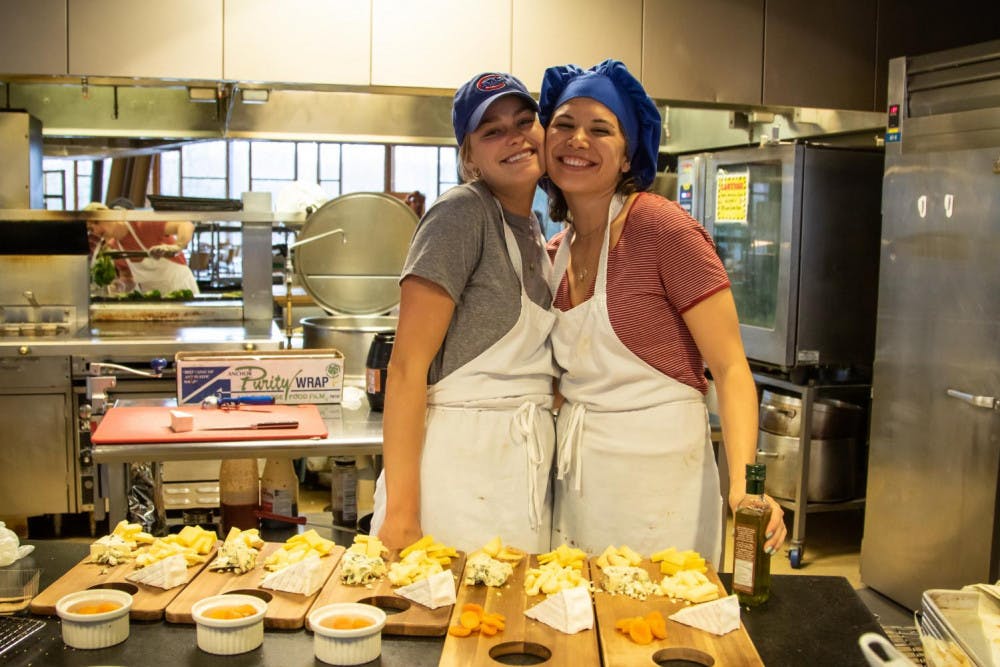It’s 3 p.m. on a Friday afternoon and seniors Grace Stimson and Hannah Seabury are hard at work in the kitchen. They’ve been here all week, prepping and planning a dinner entitled “Guilty Pleasures” — the menu boasts truffle mac ‘n’ cheese, steak and potatoes, and chocolate cake — for 40 lucky Middlebury students and their guests.
This isn’t a gourmet restaurant (although, in a way, it is). The student chefs are actually in the kitchen of Atwater Dining Hall, working with a staff of students and Atwater employees to bring Middlebury a night of fine dining for free, right on campus.
Dolci, a student-run restaurant based out of Atwater Dining Hall, has been operating at Middlebury for over 20 years, beginning in 1998. The organization, funded by Middlebury Dining Services and by the Student Activities Board, allows students to plan multi-course meals, order ingredients, prep, cook, make stylistic decisions, plate and serve for a randomly selected group of 40 students and their guests on five Fridays a semester and two Fridays in winter term.
Each dinner follows a distinctive theme and is arranged and directed by a student head chef, or a group of head chefs, who apply at the start of the semester to design a dinner. The wait staff and prep cooks are all students employed temporarily and directed by the Dolci Board.
On the Wednesday before a Dolci meal, students can submit their interest in attending, and are then randomly chosen to be treated to a free gourmet meal, to which they can bring one guest. Most weeks, the board receives over 100 applications in the first 10 or 20 minutes that the sign-up link goes live.
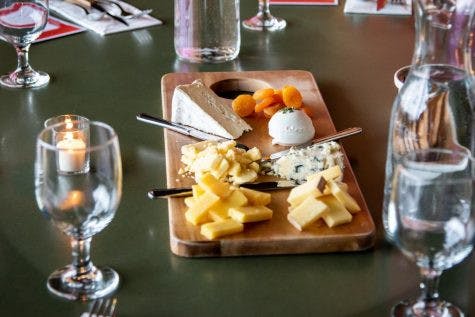
A guilty pleasures dinner would not be complete without cheese.
Dolci is managed by a team of board members, which currently includes president Sarah Yang ’19.5, kitchen managers Nora Peachin ’21 and Charlie DiPrinzio ’21, and head of wait staff Van Lundsgaard ’21. Each week that a dinner is hosted, they oversee several hired prep cooks — a mix of new workers, previously hired cooks and friends of the chefs — as well as a wait staff of three to five students and the head chefs of the meal. All of the students are assisted by Atwater dining staff.
So far this semester, Dolci dinners have included a New Orleans-themed meal, the Tastes of Spain, and last Friday’s dinner, an indulgent exploration of rich American foods and flavors.
Guilty Pleasures
The journey to Guilty Pleasures began three months ago when the chefs, both seniors, decided to “indulge in food” for their Dolci lineup.
“We tossed around a couple of ideas, starting with ‘Seven Deadly Sins,’ which lead to gluttony, which lead to the guilty pleasure idea,” Stimson explained. “We talked to friends about what food they think of when they think guilty pleasure.”
Rather than simply preparing rich foods, the chefs wanted to introduce combinations of uncommon flavors, like macaroni and cheese prepared with truffle oil. For the past month, Stimson and Seabury have focused on planning: figuring out their menu, finding recipes, deciding on ingredients and creating options for students with dietary restrictions. They met with the Atwater Commons chef manager Ian Martin to discuss the feasibility of their meal and decide on ingredients. As Seabury noted, “this is kind of our dream meal.”
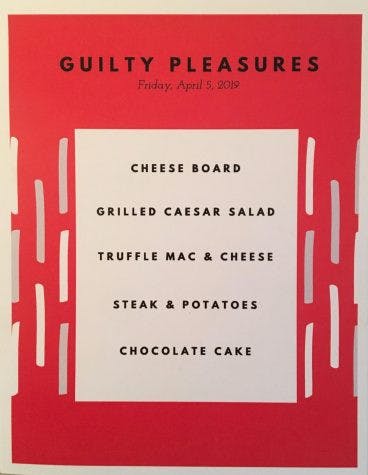
Over the course of last week, a lot of Stimson and Seabury’s preparation for their Friday dinner was informed by their experiences hosting a fall favorites-themed Dolci last semester, which ended up being a hectic and stressful affair. Learning from that dinner, the chefs chose foods that could be prepared over the course of the week and simply had to cook and plate on Friday night, instead of ones that require extensive last-minute work.
“We had to plan our time really carefully,” Stimson said. “This time we had a low-key Friday, and we got to enjoy it.”
In order to accomplish the “low-key Friday,” they did a lot of prep work earlier in the week.
“We worked Wednesday and Thursday from 3 to 7 p.m. chopping and peeling potatoes, making the mousse and the cake and the brownies ahead of time, pre-cooking the pasta. Seasoning the steaks. Grating cheese,” Seabury explained. “It’s not that glamorous, but we get all of that out of the way.”
Dolci is by no means a singular effort by the meal’s head chefs. Seabury and Stimson collaborated extensively with the Dolci board, the Atwater staff and even the wait staff on developing their meal. Initially, they had planned to bake the macaroni in ramekins but changed their minds after wait staff suggested baking the pasta separately and then transferring it to the dishes so that they would not be too hot to serve.
Throughout the week, the Atwater staff juggles their regular dining hall duties with helping the Dolci team prep their meal.
“On Friday, they will be working on other meals but if we have a question they’ll completely stop their work and help us. They’re wonderful,” Stimson said.
For those who have never made it to a Dolci dinner before, the atmosphere is absolutely nothing like a dining hall. Rather than an array of napkin dispensers and empty salt shakers, Atwater tables are home to flickering candles, wooden-handled knives and water goblets. Guests are brought to their tables by wait staff, and attendees sit while the entire meal is served to them: drink orders are taken (dining hall, soda-fountain options, but out of a stemmed goblet, the experience just feels different) and courses are delivered, one after another, in a diversity of never-before-seen dishware.
I am seated with a group of six other lucky ticket winners, and we gorge on a cheese board with cheddar, goat cheese and bleu cheese, among other varieties, along with flavorful crackers, dried apricots and olives. Next, a grilled Caesar salad, served as an entire head of charred lettuce topped with shaved parmesan, vibrant dressing and bacon (sans bacon in the vegetarian option and sans parmesan in the vegan).
Then, the dishes start to get heavier and the pleasures guiltier. Truffle oil macaroni and cheese, served in ramekins and topped with a cracker crumble. Steak and potatoes — the vegetarian/vegan variety comes instead with grilled cauliflower, seasoned with the same flavorful rub as the steak. Finally, chocolate cake, chocolate mousse and strawberries dusted with cocoa powder. It’s a lot, but that’s the point.
As we enjoy our meal, we listen to a playlist of “guilty pleasure songs” submitted by the attendees: there’s lots of Justin Bieber, Jonas Brothers and other early 2000s tracks.
My tablemates are, for the most part, repeat Dolci diners. As we eat, they reflect on past meals, recalling specific dishes and evenings that have lingered in their minds. It seems, in these discussions, that among certain friends, groups and sports teams, Dolci is well-known and highly anticipated, but to much of the campus, it’s a bit of a secret.
Behind the Scenes with the Board
The students on Dolci’s board are the gatekeepers of these Friday evening meals. They are involved in the preparation of every meal, and occasionally head chef meals of their own.
Every semester, the board receives between nine and 15 meal applications, a number that far exceeds the Dolci nights in a semester.
“We get quite a few applications that are cultural meals, things that people cook at home or associate with home countries, or people who have gone abroad and want to bring that cuisine back,” Peachin explained. “Sometimes people will focus on a specific ingredient.”
Ingredient-focused meals from the past include goat cheese, egg and salt.
In order to make their decisions about which meals get made, the board often considers creativity and environmental impact. “We’ve started to be stricter about choosing. Environmental impact is very important,” Lundsgaard said. “We try to be mindful of our impact, and if a meal is centered around a less eco-friendly ingredient we try to think about that.”
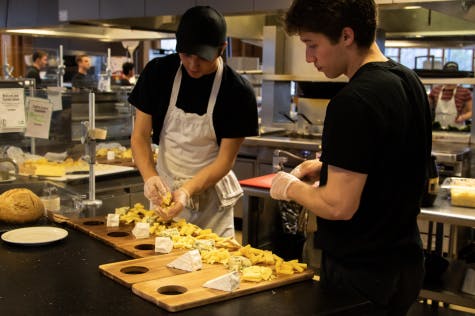
When the board chefs its own dinners, it tries to consider what foods are in season in Vermont at the time. Often, it will receive applications for meals that are variations on the same basic concepts, and the board tries to choose dinners that diverge from these norms.
“It’s a restaurant, and it’s our project,” Lundsgaard explained. “We want to make sure that there is a certain level of ingenuity that cannot be found in the dining hall, and we’re trying to push people to be more adventurous.”
The board members are involved in each of the Dolci dinners. They help the chefs plan and revise their meals, make sure they accomplish all of the necessary preparation and help with cooking and cleaning on the Friday of the meal. But they take a back seat and allow the chefs to lead their own dinners.
As Lundsgaard puts it: “Ultimately our job is to execute what the chefs want for their meals and to serve the people who come in; that’s what we’re here for.”
“We try to give the head chefs this experience that is, in my opinion, like nothing else you’ll ever do at Middlebury, while at the same time making a community and a space where anyone can feel welcome,” Peachin said. “We’re always really focused on making sure both of those things happen.”
The board does its best to develop a community through food. Head chefs are allowed to employ their friends to help prep, which creates a comfortable atmosphere in the kitchen.
“I could get a job at a restaurant in town and probably make a lot more money, but working here is something different,” Lundsgaard said of his experience. “It’s more communal, something that we’re doing for the community, not just serving people food. At the end of the night you feel a sense of accomplishment.”
Stimson and Seabury also noted this phenomenon. “You get paid to cook: if you like cooking it’s the best job on campus, you can get paid to cook during the week and then enjoy the meal on Friday. It’s the best of both worlds,” Stimson said.
“This was one of the best experiences that I had here at Middlebury,” Seabury explained. “Both of us are graduating and we’re really sad to leave Dolci. It’s a really cool experience that not many people get to have.”
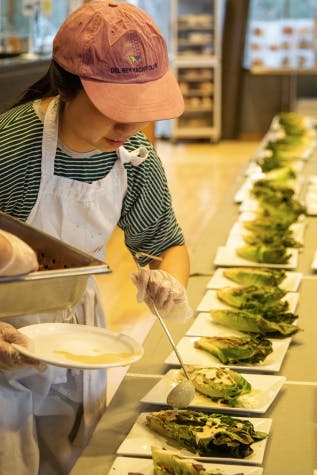
President Sarah Yang ’19.5 preps the grilled caesar salad in the kitchen.
The board members believe that the experience of sharing a meal, both eating and cooking, is a unique and invaluable way to build community, and is in so many ways different from the dining hall meals that students have every day.
“It’s much less anonymous,” Peachin said. “It feels like something shared.”
Dolci’s New Direction
My impression of Dolci as a bit of a secret has not gone unnoticed by the board. Yang, the Dolci president, is making strides to get more people involved, both in eating and working. To do this, she has created a new website (go/dolci, or eatdolci.com), where she is trying to make Dolci more accessible through photos and blog posts. She is also increasing the organization’s social media presence (@dolci.midd on Instagram) and plans to hire a social media director in the future.
“Even if you can’t attend a dinner, or you don’t know anything about Dolci, there’s a place for you to find out,” Yang said of the new efforts.
Dolci is changing in other ways, too. When Yang first became involved with the organization, far fewer people were employed or involved as head chefs. In her tenure, Yang has done her best to take the club away from this behavior, and has greatly expanded the web of students who participate in dinners.
“Now we run Dolci so that we don’t focus on doing the minimum. We try to do the most, especially in employing people,” she said.
There are many ways to get involved in Dolci: You can be a head chef, a prep cook, part of the wait staff or you can dine. Chefs must apply at the start of a semester, but to work with the kitchen or wait staff, students can go to go/workdolci on the Sunday before a dinner to sign up.
To eat, visiting go/dolcitix on the Wednesday nights prior to the dinner at 8 p.m. will bring you to the signup sheet. Tickets aren’t guaranteed, as spots are limited to 40 people, but you can show up to the dinner at 6p.m. to be added to a waitlist.

Riley Board '22 is the Editor in Chief of The Campus. She previously served as a Managing Editor, News Editor, Arts & Academics Editor and writer.
She is majoring in Linguistics as an Independent Scholar and is an English minor on the Creative Writing Track.
Board has worked as a writer at Smithsonian Folklife Magazine and as a reporter for The Burlington Free Press. Currently, she is a 2021-2022 Kellogg Fellow working on her linguistics thesis. In her free time, you can find her roller skating in E-Lot or watching the same sitcoms over and over again.

